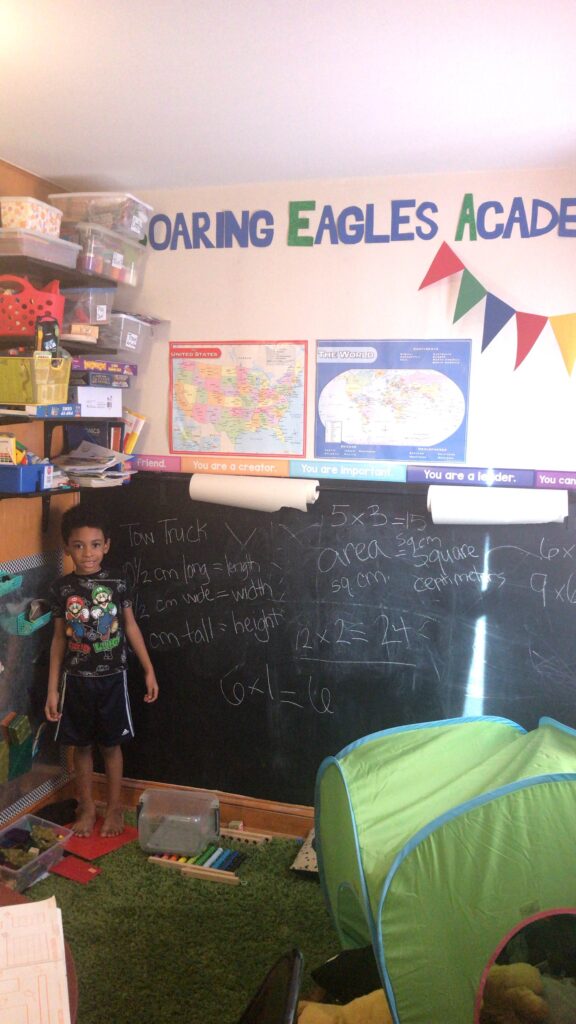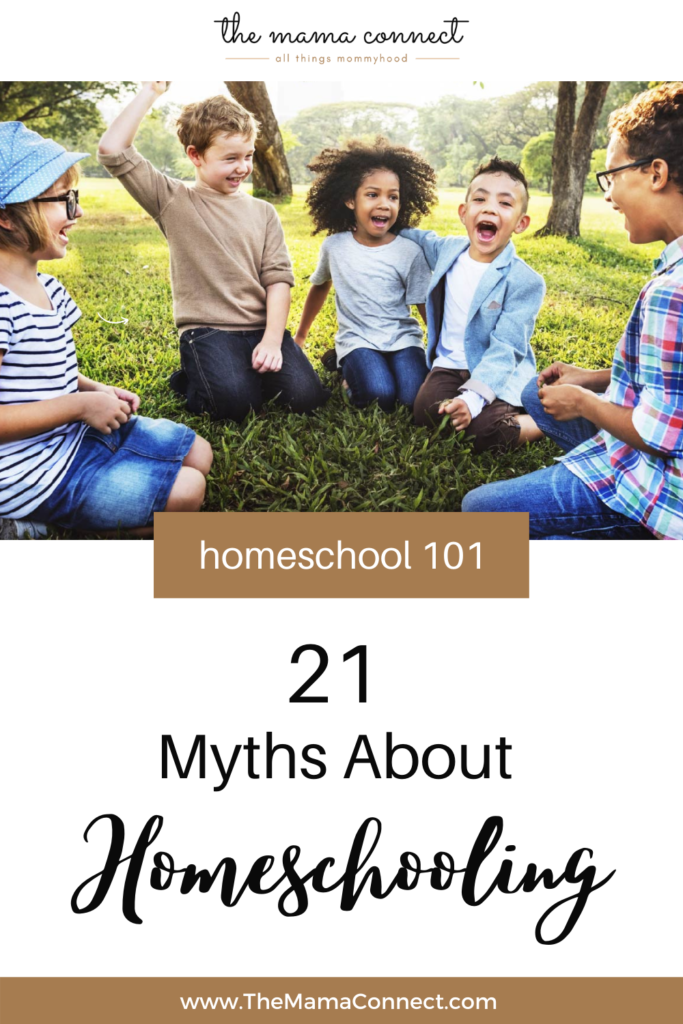
Have you ever wondered what homeschooling is all about? Or have you heard about homeschooling but are unsure if it is right for your family? Well, you’ve come to the right place because as a homeschooling mama, I too have heard quite a lot about what homeschooling is and is not. A lot of those things are on-par and speak to the experiences of many of the homeschooling families, while many other things couldn’t be farther from the truth. So, pour your favorite cup of tea, settle in, and let’s filter out the facts from the fiction by dispelling some homeschooling myths.
Myth #1: Homeschoolers do not learn how to socialize with other children.
Fact: There are many opportunities for homeschooled children to gain socialization skills outside of the home (because they definitely do gain these skills in the home, especially where there are siblings). From co-ops to team sports to classes geared towards homeschoolers, there are many opportunities for homeschoolers to build social skills and make friends, just like the average kid!
Myth #2: Homeschoolers are not prepared for the real world.
Fact: Homeschoolers are probably the most prepared for the real world, in my opinion. They learn a plethora of life skills regularly because learning happens anywhere, anytime. A routine trip to the grocery store can easily turn into lessons about cooking and meal prep, money and budgeting, time, math operations, shapes & colors, number and letter recognition, agriculture and farming, world cultures, health & nutrition, driving & community safety… shall I continue?
Myth #3: Homeschoolers are introverted and socially awkward.
Fact: While some homeschoolers are introverted and socially awkward, just as many children who are traditionally schooled, there are many other homeschooled children who are extroverted and the “life of the party”. There are many introverted, socially awkward, and down-right weird adults who were never homeschooled.
Myth #4: Homeschool is not “real school”.
Fact: Homeschool is not traditional school. Children are not one-size-fits-all and neither should their education be. There are many aspects of traditional schooling that some homeschool families choose to replicate, but many homeschool families opt-out to create their own school elements.
Myth #5: Homeschooling is very expensive.
Fact: Homeschooling does not have to be expensive at all. It really depends on your set homeschool budget (definitely set a budget or you will overspend), preferred teaching/learning styles, and desired curricula. That’s what makes homeschooling adaptable for all families. You could spend $1 per workbook, flashcards, or manipulatives from your local dollar store, or you can spend $500 on a great curriculum. There are also great resources on YouTube for free! (I love Monical Sutton’s Circle Time videos!) Additionally, there are many homeschool curricula swaps that meet periodically in-person at local libraries, as well as Facebook groups, where you can purchase gently used (and even new) curricula and resources below retail. The choice is yours!
Myth #6: You cannot homeschool your children without a college education.
Fact: You do not need a Bachelors, Masters, or Doctorate degree to teach your K-12 child. As parents, we are naturally born teachers. We are given the task to educate our children on many aspects of life in order to prepare them for adulthood. This is not to say that parents should know how to do everything. There are many parents who are not great Math or Art teachers, for example. For the subject matters that are a little difficult for us to teach as homeschooling parents, we can simply outsource to other educators, programs, or curricula for assistance.

Myth #7: Homeschooling moms are all housewives who don’t bring in any income into the home.
Fact: Homeschooling moms come from a variety of educational and occupational backgrounds. Many homeschool moms are entrepreneurs who run businesses right from their homes. Just within my own circles, the homeschool moms I know are best-selling authors, midwives, doulas, pastors wives, childbirth educators, consultants, ESL teachers, fashion designers, non-profit owners… The list goes on!
Myth #8: Homeschooling is not necessary when you are paying high taxes towards public schools.
Fact: For many families, the choice to homeschool is absolutely necessary and personal. This is especially true when talking about educational racism and inequalities for people of color, incidents of bullying, lack of sufficient learning resources, or the ability to ensure that their child is being taught things that align with their family’s values and beliefs.
Myth #9: Homeschoolers don’t get access to the same curricula as students in traditional schools.
Fact: In many public school districts, homeschooled students are entitled to participate in the extracurricular activities and even some subject classes as those students who attend those schools. Homeschool families are also able to request a copy of the same textbooks being used in public schools, although most families opt-out. Lastly, most computer programs/apps used in public schools offer special rates for homeschool families.
Myth #10: Homeschoolers can’t participate in extracurricular activities, like team sports or clubs.
Fact: In general, homeschoolers are entitled to participate in their local public school’s team sports and clubs. Additionally, there are many community-wide sports teams and clubs that students of all educational backgrounds participate in together.
Myth #11: You can’t homeschool through high school.
Fact: You absolutely can homeschool through high school.
Myth #12: Homeschoolers have a hard time getting into college.
Fact: Homeschoolers face many of the same successes and challenges of college admissions as do students from traditional schools. Many homeschooled students have gone on to graduate from a variety of prestigious colleges and universities.
Myth #13: Homeschool families live on farms in rural cities.
Fact: There are homeschool families everywhere, from large, urban cities to small, rural towns.
Myth #14: Homeschoolers high schoolers miss out on Prom and Graduation.
Fact: There are many opportunities for homeschooled high schoolers to participate in proms and graduations. These events are often sponsored by co-ops or are collaborative efforts by homeschool families who choose to gather their students together to share in these events. Additionally, many school districts allow homeschooled students to attend the local high school’s prom and graduation ceremony.

Myth #15: Only White Christians with a lot of children homeschool.
Fact: Homeschooling families represent a variety of belief/non-belief systems and ethnic backgrounds, and many of them only have one or two homeschooled children. In fact, there has been a rise in Black families choosing to homeschool their children because of inconsistent, unsupportive, and unequal public school systems in their cities.
Myth #16: Homeschoolers sit around all day at home doing nothing.
Fact: Many homeschooling families spend up to 3 hours daily, on average, doing school work.
Myth #17: Homeschooling is only a valid, temporary way of learning because of COVID-19.
Fact: While it is true that homeschooling became the sole way of learning for students during the COVD-19 pandemic, it has been a choice for families for ages. Many students have thrived in the homeschool environment and many families choose to homeschool through high school.
Myth #18: Homeschool is online learning.
Fact: Online learning is a tool in which students can learn while being homeschooled. There are many other tools available for students who are homeschooled, such as using textbooks/workbooks, audio/video, play, exploring nature, visiting museums, various styles of kinesthetic learning, and more.
Myth #19: Homeschooling is not an option for neither children with special needs nor those who are advanced.
Fact: Homeschooling is an amazing option for children with special needs because they can receive individualized support. Likewise, the same is true for children who are advanced for their age.
Myth #20: Your children will not be able to differentiate your role as a teacher from that of a parent and they will not listen to you.
Fact: Children who don’t listen to their parents is a parenting issue; not a homeschool issue.
Myth #21: Homeschooling is a luxury.
Fact: For many families, homeschooling is a necessity because of their experiences of being failed by the school system, whether through lack of support, lack of resources, peer bullying, racial inequalities, etc.
Have you heard of any other homeschool myths? My hope is that you have a clearer understanding of what homeschooling is all about (and what it’s not) so that you can make a well-informed decision for your family.

Now that we have sorted out the “fact from fiction”, which of these surprised you the most? Are there any other Homeschooling Myths that you have heard of? Are you considering homeschooling and want more information? Share your thoughts in the comments.


